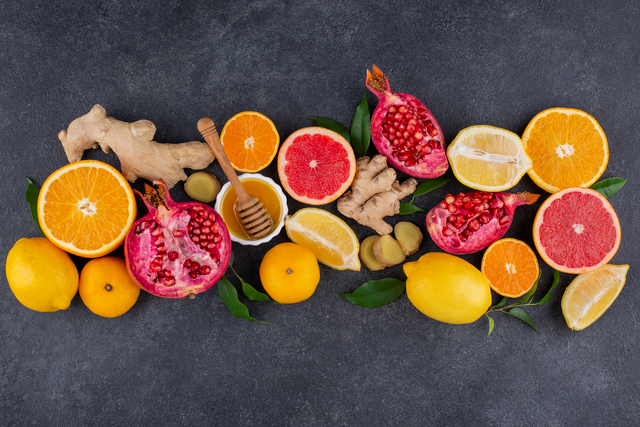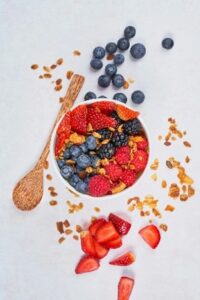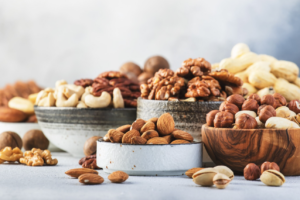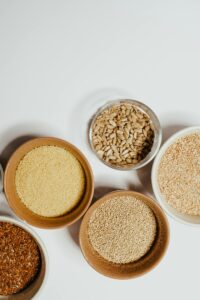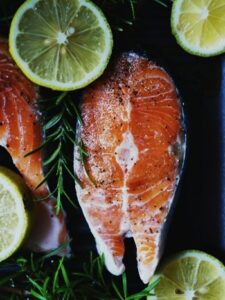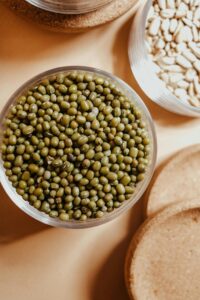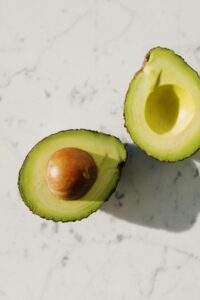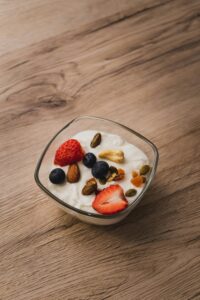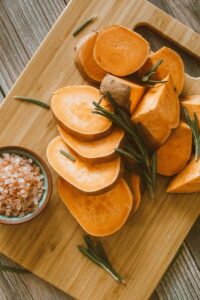Vitality encompasses physical, mental, and emotional well-being, reflecting a person’s overall health and dynamism. People with high vitality typically exhibit enthusiasm, vigor, and the capacity to handle stress and challenges effectively. Vitality can be influenced by various factors, including nutrition, exercise, sleep, mental outlook, and overall lifestyle.

Boosting vitality through diet involves consuming nutrient-dense foods that provide energy, support immune function, and enhance overall well-being. Here are some foods known for their vitality-boosting properties:
1. Leafy Greens
Examples: Spinach, kale, Swiss chard
Benefits: Rich in vitamins A, C, K, and folate, as well as iron, magnesium, and calcium. They support energy production and improve overall health [1,2]! Moreover, leafy greens are a fantastic source of dietary fiber, which promotes digestive health, helps regulate blood sugar levels, and contributes to a feeling of fullness, aiding in weight management. The recommendation is to aim for at least 2 cups raw or 1 cup cooked of leafy greens per day for adults, as advised by dietary guidelines such as those from the U.S. Department of Agriculture (USDA).
2. Berries
Examples: Blueberries, strawberries, raspberries
Benefits: High in antioxidants, vitamins, and fiber. They combat oxidative stress and support brain and heart health. Berries are also relatively low in calories and sugar compared to many other fruits, making them an excellent choice for maintaining a balanced diet. Incorporating berries into your meals, whether as a topping for yogurt, oatmeal, or salads, or simply enjoyed on their own as a snack, can provide a delicious and nutritious boost to your vitality.
3. Nuts and Seeds
Examples: Almonds, walnuts, chia seeds, flaxseeds
Benefits: Provide healthy fats, protein, fiber, and essential minerals. They support sustained energy and cognitive function. Just be mindful of portion sizes, as nuts and seeds are calorie-dense foods. Enjoy them as a snack, sprinkle them on salads or yogurt, or use them as ingredients in recipes to reap their health benefits and support your overall vitality.
4. Whole Grains
Examples: Quinoa, brown rice, oats
Benefits: Rich in fiber, vitamins, and minerals. They provide lasting energy and support digestive health. Aim to make at least half of your grain intake whole grains, and enjoy them as part of balanced meals and snacks to support your energy levels, overall health, and vitality.
5. Fatty Fish
Examples: Salmon, mackerel, sardines
Benefits: High in omega-3 fatty acids, which are essential for heart and brain health. They also provide high-quality protein. In general, aim for at least 2 servings
of fatty fish weekly. If this is not possible, consider an Omega-3 supplementation to get a hold of those essential fatty acids for your body.
6. Legumes
Examples: Lentils, chickpeas, black beans
Benefits: Excellent sources of plant-based protein, fiber, iron, and B vitamins. They stabilize blood sugar levels and provide sustained energy.
7. Citrus Fruits
Examples: Oranges, grapefruits, lemons
Benefits: High in vitamin C and antioxidants. They boost immune function and improve skin health. The antioxidants in these citrus fruits can help fight inflammation and protect cells from
damage [3,4]. Their refreshing taste can also provide a quick pick-me-up, making them a great snack or addition to meals. Consuming citrus fruits regularly can contribute to increased energy
levels and overall vitality, supporting your body’s natural functions and keeping you feeling vibrant and healthy.
8. Dark Chocolate
Benefits: Contains antioxidants, iron, magnesium, and fiber. In moderation, it can improve mood and energy levels [5,6]. The darker the better! We are looking at a healthy snack with lower sugar content.
9. Avocados
Benefits: Rich in healthy fats, fiber, and various vitamins and minerals. They support heart health and provide sustained energy [7].
10. Green Tea
Benefits: Contains antioxidants and caffeine. It can improve brain function, boost metabolism, and provide a gentle energy boost without the crash associated with coffee [8].
11. Yogurt and Fermented Foods
Examples: Kefir, sauerkraut, kimchi
Benefits: Contains probiotics, which support gut health and enhance nutrient absorption. Probiotics help maintain a healthy balance of gut bacteria, which is crucial for a robust immune response. They can outcompete pathogenic bacteria, reducing the risk of infections and inflammation. A balanced gut microbiota is associated with improved barrier function and reduced gut permeability, preventing harmful substances from entering the bloodstream and triggering immune responses [10]. Not a fan of fermented foods? A probiotic supplement can help, too!
12. Sweet Potatoes
Benefits: Packed with essential nutrients like vitamin A, vitamin C, potassium, and fiber, they provide sustained energy and support overall well-being. Their natural sweetness makes them a delightful addition to various dishes, from savory soups to sweet pies. Plus, their complex carbohydrates offer a steady release of energy, helping you stay fueled throughout the day. So, incorporating sweet potatoes into your diet can contribute to your vitality and overall health!
Summary
The foods discussed above are celebrated for their diverse array of vitamins, minerals, fiber, antioxidants, and other beneficial compounds, which support energy levels, immune function, heart health, cognitive function, and more. By prioritizing these nutrient-dense foods and integrating them into meals and snacks, individuals can enhance their vitality and overall quality of life, promoting a holistic approach to health and well-being.
About Agnes
Agnes is an accredited nutritionist by SNDA (Singapore Nutrition & Dietetics Association). Prior to Persona, she worked in community settings, providing training and managing events. She loves working with people and is passionate about changing people’s lives through nutrition.
*These statements have not been evaluated by the Food and Drug Administration. This product is not intended to diagnose, treat, cure, or prevent any disease.
This information is not intended as a substitute for the advice provided by your physician or other healthcare professional, or any information contained on or in any product label or packaging. Do not use the information from this article for diagnosing or treating a health problem or disease, or prescribing medication or other treatment. Always speak with your physician or other healthcare professional before taking any medication or nutritional, herbal, or homeopathic supplement, or using any treatment for a health problem. If you have or suspect that you have a medical problem, contact your healthcare provider promptly. Do not disregard professional medical advice or delay in seeking professional advice because of something you have read in this article.
